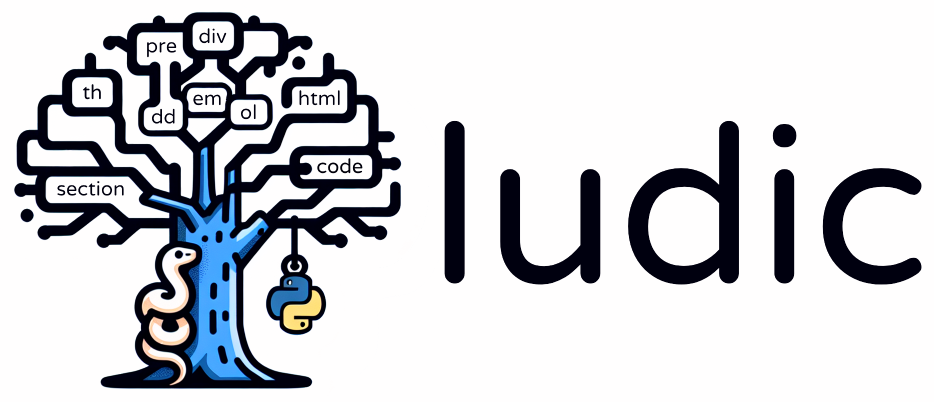
Security News
Oracle Drags Its Feet in the JavaScript Trademark Dispute
Oracle seeks to dismiss fraud claims in the JavaScript trademark dispute, delaying the case and avoiding questions about its right to the name.

Documentation: https://getludic.dev/docs/
"I've just composed my first PageLayout component and I have no words!"
– Igor Davydenko
Ludic is a lightweight framework for building HTML pages with a component approach similar to React. It is built to be used together with htmx.org so that developers don't need to write almost any JavaScript to create dynamic web services. Its potential can be leveraged together with its web framework which is a wrapper around the powerful Starlette framework. It is built with the latest Python 3.12 features heavily incorporating typing.
Here is a table comparing Ludic to other similar tools:
| Feature | Ludic | FastUI | Reflex |
|---|---|---|---|
| HTML rendering | Server Side | Client Side | Client Side |
| Uses a template engine | No | No | No |
| UI interactivity | </> htmx* | React | React |
| Backend framework | Starlette, Django* | FastAPI | FastAPI |
| Client-Server Communication | HTML + REST | JSON + REST | WebSockets |
(*) HTMX as well as Starlette or Django are optional dependencies for Ludic, it does not enforce any frontend or backend frameworks. At it's core, Ludic only generates HTML and allows registering CSS.
This framework allows HTML generation in Python while utilizing Python's typing system. Our goal is to enable the creation of dynamic web applications with reusable components, all while offering a greater level of type safety than raw HTML.
Key Ideas:
Here is an example of how Python's type system can be leveraged to enforce HTML structure:
br("Hello, World!") # type error (<br> can't have children)
br() # ok
html(body(...)) # type error (first child must be a <head>)
html(head(...), body(...)) # ok
div("Test", href="test") # type error (unknown attribute)
a("Test", href="...") # ok
Instead of using only basic HTML elements, it is possible to create modular components with the support of Python's type system. Let's take a look at an example:
Table(
TableHead("Id", "Name"),
TableRow("1", "John"),
TableRow("2", "Jane"),
TableRow("3", "Bob"),
)
This structure can be type-checked thanks to Python's rich type system. Additionally, this Table component could have dynamic properties like sorting or filtering.
Python 3.12+
pip install "ludic[full]"
Similar to Starlette, you'll also want to install an ASGI server:
pip install uvicorn
You can also use a basic cookiecutter template to get quickly started:
cookiecutter gh:getludic/template
components.py:
from typing import override
from ludic import Attrs, Component
from ludic.html import a
class LinkAttrs(Attrs):
to: str
class Link(Component[str, LinkAttrs]):
classes = ["link"]
@override
def render(self) -> a:
return a(
*self.children,
href=self.attrs["to"],
style={"color": self.theme.colors.primary},
)
Now you can use it like this:
link = Link("Hello, World!", to="/home")
web.py:
from ludic.web import LudicApp
from ludic.html import b, p
from .components import Link
app = LudicApp()
@app.get("/")
async def homepage() -> p:
return p(f"Hello {b("Stranger")}! Click {Link("here", to="https://example.com")}!")
To run the application:
uvicorn web:app
Here is a list of integrations and a link to the guide on how to get started:
For more complex usage incorporating all capabilities of the framework, please visit the examples on the web or go to the folder with examples on GitHub.
Any contributions to the framework are warmly welcome! Your help will make it a better resource for the community. If you're ready to contribute, read the contribution guide.
FAQs
Lightweight framework for building dynamic HTML pages in pure Python.
We found that ludic demonstrated a healthy version release cadence and project activity because the last version was released less than a year ago. It has 1 open source maintainer collaborating on the project.
Did you know?

Socket for GitHub automatically highlights issues in each pull request and monitors the health of all your open source dependencies. Discover the contents of your packages and block harmful activity before you install or update your dependencies.

Security News
Oracle seeks to dismiss fraud claims in the JavaScript trademark dispute, delaying the case and avoiding questions about its right to the name.

Security News
The Linux Foundation is warning open source developers that compliance with global sanctions is mandatory, highlighting legal risks and restrictions on contributions.

Security News
Maven Central now validates Sigstore signatures, making it easier for developers to verify the provenance of Java packages.